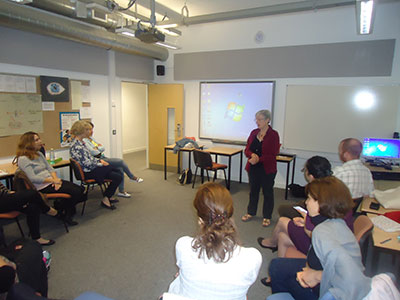|
Events
28.07.2015 |
|
During 27-30 April and 20-24 July, 2015, two training programs were organized and held at the Plymouth University, UK, for the specialists of Yerevan State Medical University, Russian-Armenian University, Tel-Aviv University, and Technion Institute of Technology of Israel. Both training programs were mainly on how to learn and practice genetic counselling skills. |
|
Two training programs were organized and held at the Plymouth University, UK, for the specialists of YerevanState Medical University, Russian-Armenian University, Tel-Aviv University, and Technion Institute of Technology of Israel. Both training programs were mainly on how to learn and practice genetic counselling skills and included the following topics:
27-30 April, 2015: on counselling skills for genetic healthcare
- Revision of basic skills of counselling – Rogerian theory. Revision of core conditions for counselling
- Skills practice session
- Discussion of cases brought by participants
- Transactional analysis – utilising the theory for work with clients and families
- Self-development exercises related to Transactional analysis. Life script and identifying own ego states
- Discussion on course assignments
- Practical skills session
- Discussion of cases brought by participants
- Theory - Grief, loss and tasks of mourning
- Transference and counter-transference: issues in genetic counselling
- Practical skills session, stone exercise
- Supervision, co-supervision and support. Exercise on supervising, using case from the course.
20-24 July, 2015: on teaching clinical genetics and genetic counselling
- The quality of training – how does it influence the student to become a specific type of practitioner?
- Creating a positive learning environment and creating reflective practitioners
- Revision of Rogers’ core skills
- Own professional qualities and pitfalls
- Use of distance learning - teaching science as an example
- Teaching and assessing family history taking
- Psychosocial aspects of genetic healthcare
- Working with transactional analysis in genetic counselling
- Encouraging self-knowledge in students – use of transactional analysis exercises
- Teaching inheritance patterns and risk assessment
- Supporting student to work with loss and grief
- Encouraging self-knowledge in students – loss exercises
- Communication with patients – written correspondence
- Designing assessments and writing role plays
Every day had an opening and closing sessions, when participants expressed their thoughts and experiences of the days, and what they took from that particular day.

It was a very efficient and useful training both for counselling practice and teaching prospective. Participants shared their teaching methods or skills with the group related to ge netics education which was discussed with the whole group. Participants acted as students and also as obse rvers of the course and took notes to be used in the practice and future development of the program for Master of sciences in genetic counselling. Every day had practical sessions in groups and each of participants had an opportunity to perform counsellor’s tasks, as well as to be in a role of patient and an observer. After each practical part each participant received a feedback from the observer and had an opportunity to improve their skills for the next counselling exercise. Difficult counselling cases from own practice were presented and were discussed with the group and every possible solutions were proposed by participants and the teachers. Besides observing the teaching process and practicing genetics counselling techniques, participants saw how the assignments were done and how each student was evaluated individually. Training Agenda |
|
|
|
|
|